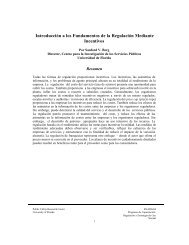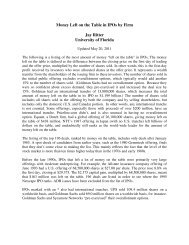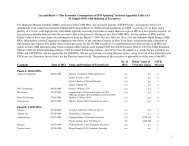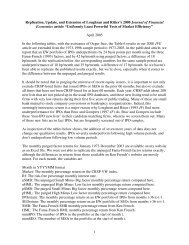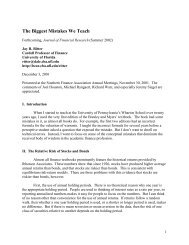Initial Public Offerings Jay R. Ritter Cordell Professor of Finance ...
Initial Public Offerings Jay R. Ritter Cordell Professor of Finance ...
Initial Public Offerings Jay R. Ritter Cordell Professor of Finance ...
You also want an ePaper? Increase the reach of your titles
YUMPU automatically turns print PDFs into web optimized ePapers that Google loves.
Since, as discussed in section 7.3 below, investment bankers rarely compete for business<br />
on the basis <strong>of</strong> <strong>of</strong>fering lower underwriting discounts (or gross spreads), an issuer will generally<br />
choose a lead underwriter on the basis <strong>of</strong> its experience, especially with IPOs in the same<br />
industry. Having a well-respected analyst who will supply research reports on the firm in the<br />
years ahead is a major consideration. The investment bankers with large market shares <strong>of</strong> IPOs<br />
include, in addition to large investment banking firms such as Merrill Lynch and Goldman Sachs,<br />
five firms that specialize in IPOs: BT Alex. Brown, Hambrecht & Quist, BancAmerica<br />
Robertson Stephens, Nationsbank Montgomery, and Friedman, Billings, Ramsey Group.<br />
After the preliminary prospectus (or “red herring,” since on the front page certain<br />
warnings are required to be printed in red) is issued, the company management and investment<br />
bankers conduct a marketing campaign for the stock. Regulations limit what can be said in this<br />
marketing campaign. This marketing effort includes a “road show” to major cities, in which<br />
presentations are made before groups <strong>of</strong> prospective institutional buyers as well as in one-on-one<br />
discussions with important IPO buyers, such as mutual funds. If the <strong>of</strong>fering is sufficiently large<br />
and has an international tranche, the road show may include presentations in London and Asia.<br />
2.2 Valuing IPOs<br />
In principal, valuing IPOs is no different from valuing other stocks. The common<br />
approaches <strong>of</strong> discounted cash flow (DCF) analysis and comparable firms analysis can be used.<br />
In practice, because many IPOs are <strong>of</strong> young growth firms in high technology industries,<br />
historical accounting information is <strong>of</strong> limited use in projecting future pr<strong>of</strong>its or cash flows.<br />
Thus, a preliminary valuation may rely heavily on how the market is valuing comparable firms.<br />
In some cases, publicly-traded firms in the same line <strong>of</strong> business are easy to find. In other cases,<br />
it may be difficult to find publicly-traded “pure plays” to use for valuation purposes.<br />
The final valuation <strong>of</strong> the firm going public typically occurs at a pricing meeting the<br />
morning a firm is expected to receive S.E.C. clearance to go public. This pricing meeting is<br />
described below in section 7.1 concerning bookbuilding. Because the IPO market is especially<br />
sensitive to changes in market conditions, and because it takes at least several months to<br />
complete the process <strong>of</strong> going public, going public is a high-stress event for entrepreneurs.<br />
Numerous cases have occurred where a firm was expecting to raise tens <strong>of</strong> millions <strong>of</strong> dollars,<br />
only to withdraw the deal at the last moment due to factors outside <strong>of</strong> its control.<br />
Because most companies prefer an <strong>of</strong>fer price <strong>of</strong> between $10.00 and $20.00 per share,<br />
firms frequently conduct a stock split or reverse stock split to get into the target price range.<br />
Stocks with a price below $5.00 per share are subject to the provisions <strong>of</strong> the Securities<br />
Enforcement Remedies and Penny Stock Reform Act <strong>of</strong> 1990, aimed at reducing fraud and abuse<br />
in the penny stock market.<br />
3




